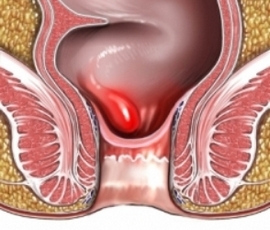Gemorroidektomija – Removal of hemorrhoids
Description hemorrhoid removal
Gemorroidektomija – surgery to remove the hemorrhoids. Hemorrhoids – swollen (extended) veins, which are located in or around the anus and rectum. Hemorrhoids can cause discomfort, pain or bleeding.

Reasons for hemorrhoidectomy
Hemorrhoidectomy is used to treat painful, swollen hemorrhoids. This procedure is commonly performed for the following reasons:
- Symptoms of hemorrhoids are not reduced after the application of other treatments;
- Hemorrhoids causes bleeding;
- Soreness in the area of hemorrhoids;
- Thrombosis hemorroydalnыh nodes;
- Hemorrhoids protrudes through the anus (prolapsed hemorrhoid).
Possible complications of hemorrhoidectomy
Complications are rare, but no procedure does not guarantee the absence of risk. If you plan to hemorrhoidectomy, you need to know about possible complications, which may include:
- Infection;
- Bleeding;
- Constipation;
- Recurrence of hemorrhoids;
- The narrowing of the anal canal;
- Urinary bladder and bowel;
- Adverse reactions to local anesthetics.
Factors, that may increase the risk of complications:
- Smoking;
- Coagulation failure;
- Advanced age;
- Previous anal surgery.
How is hemorrhoidectomy?
Preparation for the procedure
Your doctor may order the following:
- Medical checkup;
- Rectal examination;
- Anoscopy – visual inspection of the internal surface of the anus using a short tube (anoscope), which helps keep the sphincter open;
- Sigmoidoscopy – the use of a specialized endoscope (tube with a camera on the end) to explore the inside of the anus, rectum and lower part of the intestine.
In the run-up procedure:
- Do not eat or drink anything after midnight;
- Doctor will prescribe a laxative. It will cleanse the colon and rectum;
- It is necessary to organize the delivery of home after surgery;
- Consult your doctor about the drugs taken. A week before surgery you may be asked to stop taking some medicines:
- Aspirin or other anti-inflammatory drugs;
- Blood thinners, such as warfarin or heparin;
- Clopidogrel.
Anesthesia
The following types of anesthesia:
- Spinalynaya anesthesia – anesthetized lower body;
- General anesthesia – during surgery the patient is in sleep.
Procedure hemorrhoidectomy
Anoscope will be inserted into the anus and the doctor will be able to see the hemorrhoids.
Around each haemorrhoid performed incision. Swollen veins communicate, for, so they do not bleed. Then the hemorrhoid is removed. The wounds are closed with stitches or remain open until they are healed.
There are other variations of this procedure. Ask the doctor, what procedure will be used.
Immediately after hemorrhoidectomy
In a few hours the patient is sent to the recovery room.
How long will hemorrhoidectomy?
About 1-2 o'clock.
Gemorroidektomija – Will it hurt?
You should not feel pain during the procedure. After the procedure may be pain in the area of operations. In this case, the doctor will give pain medicine.
Care after hemorrhoidectomy
Ask the doctor, when it is safe to shower, bathe, or to expose the surgical site to water.
- If prescribed by a doctor, you need to take sitz baths. Bath will help relieve discomfort and clean the area operation. It is recommended in warm water 10-15 minutes. Take a sitz bath can be offered every four hours and after every bowel movement. There are devices, which can be placed on top of the toilet, to make the process easier;
- Defecate, as soon as you feel the urge to defecate;
- During defecation can not be tense, retch, and hold your breath;
- Do not sit on the toilet for long periods of time;
- To prevent constipation and relieve tension during bowel movements, use laxatives, drink plenty of fluids and eat a diet high in fiber (fruit, vegetables, legumes and whole grains);
- Apply creams or ointments as directed by a doctor;
- Avoid strenuous physical activity for two or three weeks,;
- Use stool softeners;
- As necessary, take pain medicine.
Full recovery will take 2-3 of the week. If hemorrhoids will reappear, inform the doctor.
Contact your doctor after hemorrhoidectomy
After returning home, you need to see a doctor, If the following symptoms:
- Selecting a large amount of blood;
- Signs of infection, including fever and chills;
- Pain, which does not pass after administration of designated anesthetics;
- Constipation or difficulty urinating;
- The feeling of pain in the area between the rectum and genitals.
